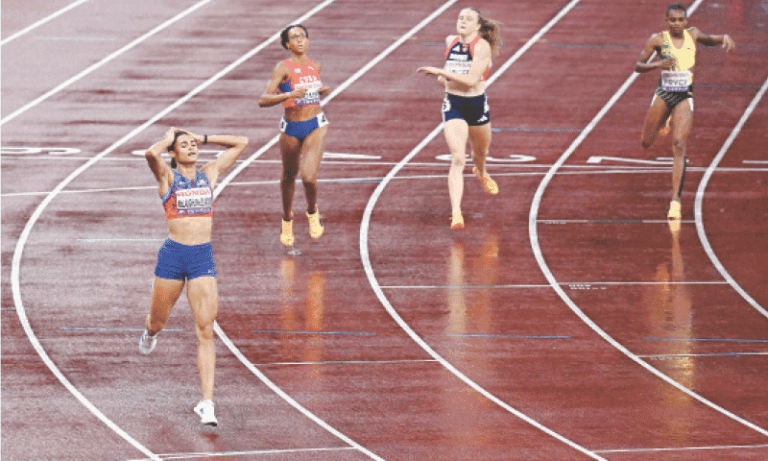Sydney McLaughlin-Levrone lit up the Tokyo National Stadium on Thursday night with a breathtaking performance that came agonizingly close to breaking one of athletics’ most enduring records. Running through the rain, the American superstar stormed to victory in the women’s 400 metres final with a time of 47.78 seconds, the second fastest in history. Her display not only brought the crowd to its feet but also confirmed that her transition from hurdles to the flat this season was a masterstroke. The world record of 47.60 seconds set by East Germany’s Marita Koch in 1985 still stands, but McLaughlin-Levrone’s latest run suggests it may finally be within reach. She had previously triumphed at the same venue during the Tokyo Olympics in the 400m hurdles, though that was behind closed doors due to Covid restrictions. This time, she was able to celebrate with the crowd and share a special moment with her husband, Andre Levrone Junior, who was in the stands. Reflecting on her achievement, McLaughlin-Levrone credited her coach Bobby Kersee for pushing her mindset, saying, “You got to go out there and take the belt. It’s not yours and you got to go earn it.”
Also Read: Pakistan Ready for India Clash in Asia Cup Super Fours
While McLaughlin-Levrone stole the headlines, Botswana made history in the men’s 400m final. Busang Collen Kebinatshipi, a relatively unknown athlete before this championship, stunned the field to claim gold with a time of 43.53 seconds, the fastest run of the year. His victory was made even sweeter as his compatriot Bayapo Ndori surged to bronze, securing Botswana’s first-ever medals in the event. Kebinatshipi, still in awe of his achievement, said, “This is my first title and it feels crazy. In the final, I had no fear. I wanted to go all out and see where I could go.” His breakthrough performance ensures that Botswana will now be regarded as a serious force in one-lap sprinting.
Trinidad and Tobago also enjoyed a remarkable evening, walking away with two medals of their own. Veteran Jereem Richards produced a storming finish to clinch silver in the men’s 400m, while 2012 Olympic champion Keshorn Walcott surprised many by recapturing the world title in the javelin. The pair, who are roommates, were delighted to share success once more, with Richards joking, “When we spoke about this before the competition it looked like a joke. Now it’s a reality.” Their triumphs provided a huge morale boost for their nation.
Elsewhere, Venezuela’s iconic triple jump star Yulimar Rojas saw her run of four consecutive world titles come to an end. The 29-year-old, who missed the Paris 2024 Olympics due to an Achilles injury, was denied gold by Cuba’s Leyanis Perez Hernandez. For Cuba, it was a return to the top of the event after a 16-year gap. Despite the disappointment, Rojas expressed pride in her resilience, saying, “I had two very tough years but this is the life of an athlete. You have to go through hard times and show you can come back.”
On the distance running side, Kenya continued to showcase its dominance, with its athletes cruising through the women’s 5,000m qualifying heats. A thrilling final is expected on Saturday between world record holder Beatrice Chebet and reigning champion Faith Kipyegon, both aiming for doubles after earlier triumphs in Tokyo. Meanwhile, Britain’s Keely Hodgkinson signaled her return to top form in the women’s 800m. The 23-year-old, who battled hamstring problems over the past year, won her heat comfortably and remains the favorite for gold. She recently posted the fastest time of the year at the Silesia Diamond League and expressed her determination, saying victory in Tokyo would mean more than ever.
The night in Tokyo highlighted the sport’s ability to produce drama, history, and unforgettable stories in equal measure. From McLaughlin-Levrone’s near-record-breaking brilliance to Kebinatshipi’s stunning breakthrough and Rojas’ emotional battle, it was a reminder that athletics remains the ultimate stage for resilience and triumph.


